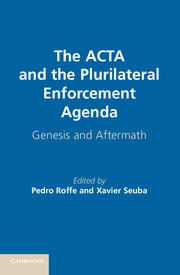Book contents
- Frontmatter
- Contents
- List of Contributors
- Foreword
- Acknowledgments
- Acronyms
- Introduction
- PART I THE FINAL ACT: ITS MAIN FEATURES AND CONTENTS
- PART II DOMESTIC LEGISLATIVE CHALLENGES
- PART III IMPACT ON RELATED PROCESSES
- PART IV VIEWS FROM STAKEHOLDERS: LESSONS
- PART V WHAT LIES AHEAD ACTA
- 21 Assessing the Implications of ACTA for the European Union
- 22 ACTA
- 23 What Was Left Out of ACTA
- 24 Slaying the ACTA Myths
- 25 Developing Countries and the Contestation of ACTA at the TRIPS Council
- 26 ACTA: What Lessons for Future Plurilateral Trade Agreements?
- Annex I Anti-Counterfeiting Trade Agreement
- References
- Index
- References
21 - Assessing the Implications of ACTA for the European Union
Legitimate Aim but Wrong Means
Published online by Cambridge University Press: 05 December 2014
- Frontmatter
- Contents
- List of Contributors
- Foreword
- Acknowledgments
- Acronyms
- Introduction
- PART I THE FINAL ACT: ITS MAIN FEATURES AND CONTENTS
- PART II DOMESTIC LEGISLATIVE CHALLENGES
- PART III IMPACT ON RELATED PROCESSES
- PART IV VIEWS FROM STAKEHOLDERS: LESSONS
- PART V WHAT LIES AHEAD ACTA
- 21 Assessing the Implications of ACTA for the European Union
- 22 ACTA
- 23 What Was Left Out of ACTA
- 24 Slaying the ACTA Myths
- 25 Developing Countries and the Contestation of ACTA at the TRIPS Council
- 26 ACTA: What Lessons for Future Plurilateral Trade Agreements?
- Annex I Anti-Counterfeiting Trade Agreement
- References
- Index
- References
Summary
Introduction
The Anti-Counterfeiting Trade Agreement (ACTA) is a plurilateral agreement aimed, according to its Preamble, at providing effective and appropriate means for the enforcement of intellectual property rights. The issue is obviously important, since the attractiveness of intellectual property rights risks being seriously undermined if they cannot be enforced in an appropriate manner. For this reason, the creation of an effective system to secure a proper enforcement of intellectual property rights and to combat counterfeiting has been a constant preoccupation of the European Union (EU) over the last few years. Serious efforts have been made and numerous initiatives undertaken by the EU and its member states to improve the European legal framework in this regard. Following an evaluation report published on 22 December 2010, the European Commission has announced its intention to revise the reference text on the topic, the Directive of 29 April 2004, which has now been implemented in all the member states. Work has also started on an amendment of the regulation of 22 July 2003 concerning customs action against goods suspected of infringing certain intellectual property rights. In 2009, the Commission also set up a European Observatory on Counterfeiting and Piracy, one of whose principal objectives is to collect and transmit data on the economic and social consequences of counterfeiting, and whose powers were recently considerably increased. It is only in the sensitive field of criminal penalties for counterfeiting that harmonisation has not yet succeeded, mostly because of the considerable opposition that a proposed directive on this matter encountered within the European Parliament. This resistance ultimately led to the text being withdrawn by the European Commission on 18 September 2010.
- Type
- Chapter
- Information
- The ACTA and the Plurilateral Enforcement AgendaGenesis and Aftermath, pp. 313 - 328Publisher: Cambridge University PressPrint publication year: 2014



